2017.03.英语组教研计划
英语教研组教研计划

英语教研组教研计划一、背景随着全球化和信息化的发展,英语作为全球通用语言,越来越受到重视,也越来越受到各个年龄段人士的关注。
在这样的背景下,英语教育逐渐成为了国家教育事业的重中之重,而英语教研则是英语教育工作中不可或缺的一部分。
英语教研组是学校英语教育的核心力量,教研组需要制定科学合理的教研计划,针对学生英语水平的特点和需要,共同探究教学方法和策略,提高教学质量和效率。
二、教研计划2.1 教研主题本次教研以“如何提高学生听力与口语水平”为主题,深入探讨如何在课堂中帮助学生提高听说能力,同时充分结合学生兴趣爱好和实际生活,推动英语教育教学工作的创新和发展。
2.2 教研目标本次教研的目标主要是:•提高教师的课堂教学水平,创新教学手段;•帮助学生有效地提高英语听力与口语水平,让学生更好地迎接英语考试;•提高学生的英语学习兴趣,激发学生学习英语的热情;•探究如何将英语教育教学工作融入学生实际生活。
2.3 教研任务本次教研的任务主要包括:1.教研组成员相互讨论,制定听说教学的策略和方法;2.从教学参考书籍和网站中查找相关资料,进行集体讨论;3.教师们在自己的课堂上实践并分享教学经验;4.救研组成员互相评价,分享教育教学反思体会,总结本次教研的效果。
2.4 教研步骤本次教研分为以下几个步骤:1.制定教研计划并分工,确定每个教研成员的任务;2.教研成员自学听说教学方法,互相交流;3.结合教研主题,每个教研成员制定自己的授课计划,包含教学目标,教学内容,教学重点和难点;4.实施授课计划,教师们在课堂上进行不同形式的听说教学实践;5.教研成员互相评价授课计划,互相提出建议,总结教育教学上的反思体会;6.教研组成员进行总结,共同完成教研报告。
三、教研成果经过本次教研,英语教师们在听说教学方法上得到了较大提高,也在教研中交流相互分享了各自的经验和体会。
同时,学生们的英语听说水平也得到了部分提升,在提高英语学习兴趣和口语表达方面取得了显著的价值。
2017学年度英语教研组工作计划
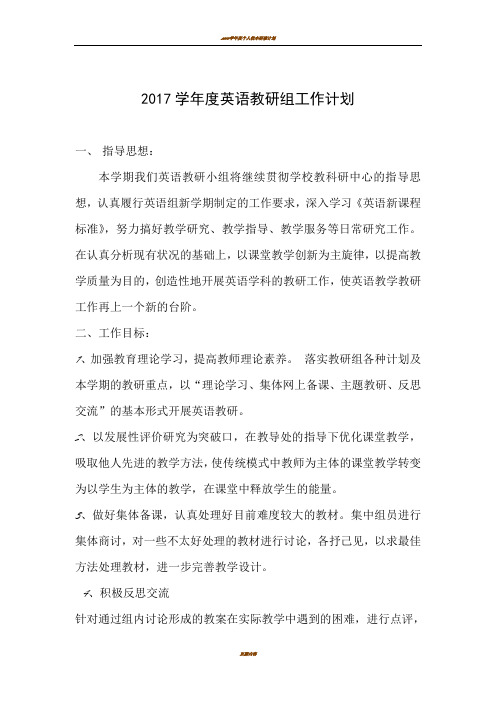
2017学年度英语教研组工作计划一、指导思想:本学期我们英语教研小组将继续贯彻学校教科研中心的指导思想,认真履行英语组新学期制定的工作要求,深入学习《英语新课程标准》,努力搞好教学研究、教学指导、教学服务等日常研究工作。
在认真分析现有状况的基础上,以课堂教学创新为主旋律,以提高教学质量为目的,创造性地开展英语学科的教研工作,使英语教学教研工作再上一个新的台阶。
二、工作目标:1、加强教育理论学习,提高教师理论素养。
落实教研组各种计划及本学期的教研重点,以“理论学习、集体网上备课、主题教研、反思交流”的基本形式开展英语教研。
2、以发展性评价研究为突破口,在教导处的指导下优化课堂教学,吸取他人先进的教学方法,使传统模式中教师为主体的课堂教学转变为以学生为主体的教学,在课堂中释放学生的能量。
3、做好集体备课,认真处理好目前难度较大的教材。
集中组员进行集体商讨,对一些不太好处理的教材进行讨论,各抒己见,以求最佳方法处理教材,进一步完善教学设计。
4、积极反思交流针对通过组内讨论形成的教案在实际教学中遇到的困难,进行点评,形成互动、互助的氛围。
进行“以老带新,以强带弱”的结对活动,促进教师间的共同提高。
5、以科研带动学科发展。
三、四年级的英语教学要多运用英语拼读规则和儿歌教学法,帮助学生有规律地记忆单词,减轻学生学习英语的难度;五、六年级的教学要帮助学生在情景中进行语言运用,采用重比较、勤归纳、多运用的原则,使学生熟练掌握较复杂的语言现象。
同时,高年级也要注重阅读教学,要有计划有步骤地提高学生的英语阅读速度和能力。
三、工作重点1、加强教研组建设。
教研组长要做好对本组教师教学常规的督查工作,带领本组教师扎扎实实地进行教研,切实提高教研活动的实效性。
通过听课、评课,学习、交流等多种活动形式,提高教研组长自身的教学水平和教研组的管理能力,以促进英语教研组建设。
2、促进教师成长。
组织青年教师进行学习,并加强检查督促。
英语教研组教研计划

英语教研组教研计划
教研组教研计划
1. 目标设定:明确教研组的目标,例如提高学生的英语听、说、读、写能力,加强教
师的教学方法和技能,提高教学效果等。
2. 主题选择:根据学校、学生和教师的实际情况,确定一个具体的教学主题,例如提
高学生的口语表达能力、培养学生的阅读习惯等。
3. 资料收集:收集相关的教学资料和资源,包括教材、课件、教学视频、教学软件等,帮助教师更好地开展教学。
4. 教学设计:根据上述主题和教学目标,设计具体的教学方案,包括教学内容、教学
方法、教学手段等。
5. 教学实施:根据教学设计,教师进行课堂教学,通过各种教学手段和方法激发学生
的学习兴趣,培养学生的学习能力。
6. 教学反思:教师进行教学反思,评估教学效果,总结教学经验,发现问题并提出改
进措施。
7. 教研分享:教师进行教研分享,将教学经验和教育教学资源与其他教师分享,相互
借鉴,共同提高教学水平。
8. 教研评估:通过教研评估,对教研成果进行评估和总结,确定下一步的教研方向和
目标,进一步改进和完善教研工作。
通过以上步骤的有机结合,不断推动教研组的教研工作,提高教师的教学水平,改善学生的学习效果,不断推动学校的教育教学工作。
英语小组教研活动计划(3篇)

第1篇Introduction:The English Language Teaching (ELT) team at [School/Institution Name] is committed to enhancing the quality of English language education through continuous professional development and collaborative research. This activity plan outlines a series of教研 activities designed to foster innovation, share best practices, and improve student learning outcomes. The activities will be conducted over a period of three months, starting from [Start Date] to [End Date].Objective:The primary objective of this教研 activity plan is to:1. Promote a culture of continuous professional development among the ELT team members.2. Enhance the effectiveness of English language teaching methods and strategies.3. Foster collaboration and sharing of resources among team members.4. Evaluate and implement innovative teaching techniques to improve student learning outcomes.Activity 1: Opening Workshop (Week 1)Date: [Date]Duration: 2 hoursObjective: To introduce the purpose, structure, and expectations of the 教研 activities.Agenda:1. Welcome and introduction of the facilitator and participants.2. Presentation on the objectives and goals of the教研 activities.3. Discussion on the importance of continuous professional development in ELT.4. Introduction to the research and development process.5. Breakout sessions for team members to share initial thoughts and ideas.6. Group reflection and feedback on the workshop.Activity 2: Expert Lecture Series (Weeks 2-4)Objective: To provide team members with insights from experts in the field of English language teaching.Schedule:- Week 2: "Innovative Teaching Techniques in the 21st Century"- Week 3: "Technology Integration in English Language Teaching"- Week 4: "Assessment Strategies for English Language Learners"Agenda:1. Presentation by the expert on the chosen topic.2. Interactive Q&A session.3. Group discussion on how to implement the presented strategies in the classroom.4. Sharing of practical examples and resources.Activity 3: Collaborative Lesson Planning (Weeks 5-8)Objective: To encourage collaboration and sharing of lesson planning ideas among team members.Schedule:- Week 5: Lesson planning for a specific unit or theme.- Week 6: Peer review and feedback on the lesson plans.- Week 7: Revision and refinement of lesson plans based on feedback.- Week 8: Finalization of lesson plans and preparation for implementation.Agenda:1. Introduction to the collaborative lesson planning process.2. Distribution of lesson planning templates and resources.3. Small group work on creating lesson plans.4. Peer review sessions to provide constructive feedback.5. Revision and refinement of lesson plans.6. Presentation of final lesson plans to the team.Activity 4: Classroom Observation and Feedback (Weeks 9-10)Objective: To observe and evaluate the effectiveness of the implemented lesson plans.Schedule:- Week 9: Observation of lessons by peers.- Week 10: Feedback sessions and reflection on observed lessons.Agenda:1. Introduction to the classroom observation process.2. Distribution of observation checklists.3. Peer observation of selected lessons.4. Feedback sessions to discuss observed strengths and areas for improvement.5. Reflection on the observed lessons and discussion of potential strategies for enhancement.Activity 5: Final Presentation and Evaluation (Week 11)Date: [Date]Duration: 3 hoursObjective: To showcase the outcomes of the教研 activities and to evaluate the impact on teaching practices.Agenda:1. Introduction to the final presentation and evaluation process.2. Presentation of key findings and outcomes from the教研 activities.3. Discussion on the effectiveness of the implemented strategies.4. Evaluation of the impact on student learning outcomes.5. Feedback from participants on the教研活动.6. Conclusion and planning for future教研活动.Conclusion:This English Language Teaching Team Research and Development Activity Plan aims to create a dynamic and supportive environment for continuous improvement in English language education. By engaging in a series of structured activities, the ELT team will be better equipped to deliver high-quality instruction and support student success.第2篇I. IntroductionThe purpose of this English group research and development activity plan is to enhance the teaching quality of English in our school by fostering a collaborative environment among teachers. This plan outlines the objectives, activities, and evaluation methods for our upcoming教研活动(research and development activity). The activities will be conducted over a period of three months, with regular meetings and follow-up assessments to ensure continuous improvement.II. Objectives1. To improve the proficiency of English teachers in both languageskills and pedagogical knowledge.2. To enhance the teaching methods and strategies used in English classes.3. To promote collaboration and knowledge sharing among teachers.4. To integrate technology into English teaching and learning.5. To evaluate and reflect on the effectiveness of our teaching practices.III. ActivitiesA. Initial Meeting (Week 1)1. Introduction and Icebreaker Activities:- Briefly introduce the purpose and objectives of the教研活动.- Conduct icebreaker activities to foster a positive andcollaborative atmosphere among participants.2. Survey of Current Teaching Practices:- Distribute a survey to gather information about the current teaching methods, challenges, and needs of the teachers.3. Setting Goals:- Based on the survey results, set individual and group goals for the duration of the教研活动.B. Monthly Meetings (Weeks 2-10)1. Focus on Specific Teaching Topics:- Each month, select a specific teaching topic (e.g., vocabulary teaching, reading comprehension, grammar, etc.).- Assign a facilitator to lead discussions and share resourcesrelated to the topic.2. Workshops and Training Sessions:- Organize workshops and training sessions to enhance teachers' knowledge and skills in the selected topic.- Invite experts or experienced teachers to share their insights and best practices.3. Collaborative Lesson Planning:- Divide teachers into small groups and assign them to plan and prepare a lesson based on the selected topic.- Encourage the use of technology and innovative teaching methods in the lesson planning process.4. Observation and Feedback:- Arrange for teachers to observe each other's lessons and provide constructive feedback.- Use observation checklists to ensure that the lessons align with the goals and objectives of the教研活动.C. Mid-term Review (Week 11)1. Progress Assessment:- Evaluate the progress made by individual teachers and the group as a whole.- Discuss the challenges faced and the strategies used to overcome them.2. Adjustment of Goals:- Revise the goals if necessary, based on the feedback and progress assessment.D. Final Meeting (Week 12)1. Reflection and Sharing:- Encourage teachers to reflect on their experiences during the教研活动.- Share successful strategies, resources, and insights gained from the activities.2. Feedback and Evaluation:- Collect feedback from teachers on the effectiveness of the教研活动.- Evaluate the overall success of the activities based on the set objectives.3. Conclusion and Next Steps:- Summarize the key takeaways from the教研活动.- Plan for future activities and initiatives to continue the momentum of improvement.IV. Evaluation1. Self-evaluation:- Teachers will complete self-evaluation forms at the end of each activity to reflect on their own progress and areas for improvement.2. Peer evaluation:- Peer observations and feedback will be collected to assess the effectiveness of the teaching methods and strategies used.3. Student feedback:- Collect feedback from students to gauge the impact of the教研activities on their learning experience.4. Documentation:- Maintain a detailed record of all activities, discussions, and outcomes for future reference and analysis.V. ConclusionThis English group research and development activity plan aims to create a supportive and collaborative environment that fosters continuous improvement in English teaching. By implementing this plan, we hope to enhance the quality of English education and empower our teachers to become more effective educators.第3篇I. IntroductionThe English teaching group at [School/Institution Name] aims to enhance the quality of English language education through collaborative research, development, and training activities. This plan outlines the objectives, activities, and timeline for our upcoming教研活动.II. Objectives1. Improve Teaching Methods: To explore and implement effective teaching strategies and methodologies that cater to diverse learning styles and needs.2. Enhance Student Engagement: To develop activities and materials that promote student participation, critical thinking, and language proficiency.3. Professional Development: To provide opportunities for teachers to enhance their pedagogical knowledge and skills.4. Curriculum Development: To contribute to the continuous improvementof the English curriculum, ensuring it aligns with national standardsand global trends.5. Resource Sharing: To foster a culture of collaboration and knowledge sharing among teachers.III. Activity ScheduleWeek 1: Pre-Activity Preparation- Date: [Start Date]- Objective: To organize and allocate responsibilities among group members.- Activities:- Introduce the objectives and expectations of the教研活动.- Divide tasks such as activity planning, resource gathering, and time management among group members.- Set up a communication platform (e.g., a group chat or email list) for easy coordination.Week 2: Literature Review and Methodology- Date: [Start Date]- Objective: To review existing literature on effective English teaching methods and determine the methodology for our activities.- Activities:- Conduct a literature review on current trends in English language teaching.- Discuss and select appropriate teaching methodologies for our activities.- Develop a research question or focus area for our group's work.Week 3: Activity Development- Date: [Start Date]- Objective: To design and develop teaching activities and materials.- Activities:- Plan lesson plans or activities that align with the chosen methodology and research question.- Create resources such as handouts, worksheets, and multimedia materials.- Peer review and feedback on the developed activities and materials.Week 4: Pilot Testing- Date: [Start Date]- Objective: To pilot test the developed activities and gather feedback. - Activities:- Conduct pilot sessions with a small group of students or colleagues.- Collect and analyze feedback on the effectiveness and feasibility of the activities.- Make necessary adjustments based on the feedback received.Week 5: Analysis and Reflection- Date: [Start Date]- Objective: To analyze the results of the pilot testing and reflect on the teaching process.- Activities:- Discuss the outcomes of the pilot testing and identify areas of success and improvement.- Reflect on the teaching strategies and methodologies used during the pilot.- Develop a report summarizing the findings and recommendations.Week 6: Implementation and Monitoring- Date: [Start Date]- Objective: To implement the refined activities and monitor their impact on student learning.- Activities:- Introduce the refined activities to a larger group of students.- Monitor student progress and gather ongoing feedback.- Adjust activities as needed based on student performance and feedback.Week 7: Sharing and Reflecting- Date: [Start Date]- Objective: To share the outcomes of the教研活动 with the wider school community and reflect on the experience.- Activities:- Organize a presentation or workshop to share the results andinsights gained from the教研活动.- Reflect on the group's experience and discuss future directions for the English teaching group.IV. EvaluationTo ensure the effectiveness of the教研活动, the following evaluation methods will be used:- Student Feedback: Collect feedback from students on the activities and materials used.- Teacher Reflection: Encourage teachers to reflect on their teaching practices and the impact of the activities on student learning.- Observation: Conduct observations of the activities to assess their implementation and effectiveness.- Data Analysis: Analyze student performance data to measure the impact of the activities on student learning outcomes.V. ConclusionThis English teaching group research and development activity plan aims to enhance the quality of English language education at[School/Institution Name]. By implementing the outlined activities andevaluating their impact, we hope to foster a culture of continuous improvement and collaboration among our teachers and students.。
英语教研组教研计划
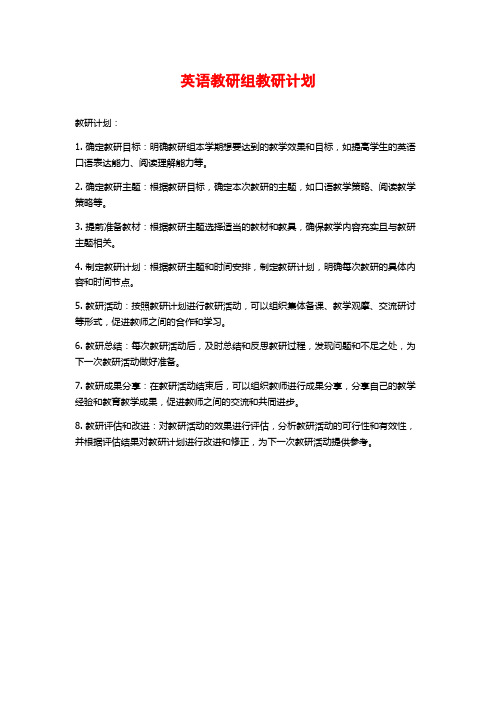
英语教研组教研计划
教研计划:
1. 确定教研目标:明确教研组本学期想要达到的教学效果和目标,如提高学生的英语口语表达能力、阅读理解能力等。
2. 确定教研主题:根据教研目标,确定本次教研的主题,如口语教学策略、阅读教学策略等。
3. 提前准备教材:根据教研主题选择适当的教材和教具,确保教学内容充实且与教研主题相关。
4. 制定教研计划:根据教研主题和时间安排,制定教研计划,明确每次教研的具体内容和时间节点。
5. 教研活动:按照教研计划进行教研活动,可以组织集体备课、教学观摩、交流研讨等形式,促进教师之间的合作和学习。
6. 教研总结:每次教研活动后,及时总结和反思教研过程,发现问题和不足之处,为下一次教研活动做好准备。
7. 教研成果分享:在教研活动结束后,可以组织教师进行成果分享,分享自己的教学经验和教育教学成果,促进教师之间的交流和共同进步。
8. 教研评估和改进:对教研活动的效果进行评估,分析教研活动的可行性和有效性,并根据评估结果对教研计划进行改进和修正,为下一次教研活动提供参考。
英语教研组教研计划优质8篇

英语教研组教研计划篇1一、指导思想及教学理念以课程改革为发展契机,以新课程标准为导向,不断研究、总结、推广教学经验,探索英语教学规律。
以提高学生语言综合运用能力为出发点,倡导、鼓励教师不断提高专业素养,用现代英语教学理念武装自己,形成自身教学风格,提升教学水平,从而全面提高英语教学质量。
培养学生学习英语的兴趣,为学生的终身学习和发展打下良好的基础;建立以“learnin g-centeredness”、“learner-centeredness”、“self-directed teaching”、“communicative languageteaching ”的课堂教学模式,提高课堂教学效益,教学立足点从“教”为主转换为以“学”为主,始终把学生作为学习的主体。
二、目标及追求努力将我组建设成为一个业务素质好、教学水平高、综合实力强的团队;继续打造和谐的、积极向上的工作氛围,做到互相交流教学感受、体会;做到“会工作、会学习、会健体”,更要争做会指导学生“三会”的教师;全体教师共同提高、充分发挥我组在全区的龙头作用,并成为区乃至市内外具影响力及竞争力的集体。
三、主要工作和措施(一)加强职业道德修养、更新教学观念为人师表,有高度的事业心以及为教育事业奉献的精神。
每一位教师应增强质量意识、主动意识、责任意识、教育管理意识。
每一位教师应以“六认真”规范教学全过程,进行有效教学的思考、作业布置的研究,着重激发学生学习英语的兴趣和培养学生的语言运用能力;更新教学观念、改变教学方式,营造民主的教学氛围、和谐的师生关系、开放的活动空间。
(二)重视教学研究,推进课程改革重点学习《英语课程标准》和《考试说明》;同时聘请教育教学专家来教研组做指导讲座,引入先进教学理念;增强校际联系,不断发展。
积极探索新课程理念下的英语教学模式、严格遵照“三项五严”规定进行减负增效的英语教学,进一步探求课堂教学的有效性,尤其尽要关注第一次教学的有效性。
英语组教研活动计划

英语组教研活动计划英语组教研活动计划为了提高英语教师的教学水平和教学质量,同时促进教师之间的交流与合作,我们计划举行一系列的英语组教研活动。
以下是具体的活动计划:一、活动主题:以“提高英语课堂教学效果”为主题,围绕教学方法、教学技巧、教学资源等方面进行深入探讨和研究。
二、活动目标:1、提高教师的课堂教学能力和水平;2、促进教师之间的交流与合作;3、探索适合我校学生的英语教学策略;4、提高学生的英语成绩和口语表达能力。
三、活动时间:每月一次,每次2个小时,具体时间视参与人员的安排而定。
四、活动地点:学校会议室或英语教室。
五、活动内容:1、开场致辞:由教研组长或主持人进行简短的致辞,介绍本次活动的主题和目标。
2、主题讲座:邀请有经验的英语教师进行主题讲座,分享自己的教学经验和教学方法,引导教师们深入思考如何提高课堂教学效果。
3、分组讨论:根据不同的教学年级和教学内容,将参与活动的教师分成若干小组,进行分组讨论,探讨适合本年级和本班学生的教学策略和教学方法。
4、互动环节:安排一些互动环节,如游戏、演讲、辩论等,让教师们积极参与,加强相互之间的交流和合作。
5、实践体验:安排一些实践教学环节,让教师们亲身体验和感受新的教学策略和方法,提高实际操作能力。
六、参与方式:1、参与对象:全校英语教师及相关教学管理人员。
2、参与方式:自愿报名参加,或由学校安排参加。
七、评估方式:1、通过教学观摩、教师评估等方式对活动效果进行评估;2、通过考试、考核等方式对参与活动的教师进行教学水平和教学质量评估。
八、活动总结:1、活动结束后,组织者要及时进行总结,分析活动的优点和不足,提出改进方案和下一步的计划;2、参与活动的教师也要进行自我总结,反思自己的教学思想和教学方法,提出自己的看法和建议,以便在今后的教学工作中加以改进和提高。
通过本次英语组教研活动,我们希望能够为英语教师提供一个交流和学习的平台,促进教师之间的合作与交流,提高英语教师的教学水平和教学质量,为学生的英语学习打下坚实的基础。
2017年小学英语教研组活动计划2

2017年度白庙乡英语教研组活动计划一、指导思想本年度要以学校和乡教研工作计划为依据, 认真学习课改理论,积极参加课改培训, 开展课题研究等活动, 更新教学观念。
转变学生的学习方式, 完善和深化英语学科教学常规, 为进一步提高我校英语教学质量而扎实开展工作。
二、具体工作:1、首先, 于开学初的教研组活动和全组教师认真学习本校的教学管理制度及常规要求, 并做好明确上课、备课、编写教案、布置作业及作业批阅中的一些具体要求, 使教师明确认识, 从思想上重视起来。
并且能有章可循, 有规可依。
在教学过程中, 即在备课、上课、作业的布置和批阅、辅导等各个环节中, 以制度为准则, 对照检查, 严格执行。
2.努力促进青年教师的成长。
青年教师是英语组的一支生力军, 教研组将继续通过听课、上课、说课、抽查等方式促其不断成长外, 还会配合教导处对青年教师的各项考核, 加强备课组内、间的相互交流, 达到互通有无, 群策群力, 发挥整个教研组的力量, 争取每个年级都能在原有的水平上有一定的提高。
3、本学期将加强集体备课, 为提高教师研讨课的质量做准备。
备课时通过民主讨论, 深刻分析, 相互比较, 使教学目标更加明确, 教学内容更加翔实, 教学效果更加突出!教研活动安排:三月份:1、制定教学计划。
2、集体备课。
3、听四年级英语公开课。
四月份:1. 主题研讨活动, 主题——“什么是有效的课堂教学”。
2. 开展集体备课活动。
3.三年级英语公开课, 要求写出公开课教案、说课稿设计, 进行评课。
五月份:1、集体备课、研讨如何上好一节英语课开展英语公开课, 参与教师交流心得, 提出不足与优点。
六月份:1、主题研讨如何上好英语复习课。
2、制定复习计划。
开展英语书法大比拼, 对书写优秀者给予适当的奖励!九月份:1.布置本学期英语教研组活动计划2.制定教学进度计划3、加强三年级学生初步学习英语的学习兴趣的培养, 以及学习方法的指导, 养成教育, 培养学生正确的英语学习习惯。
英语教研组教研计划7篇
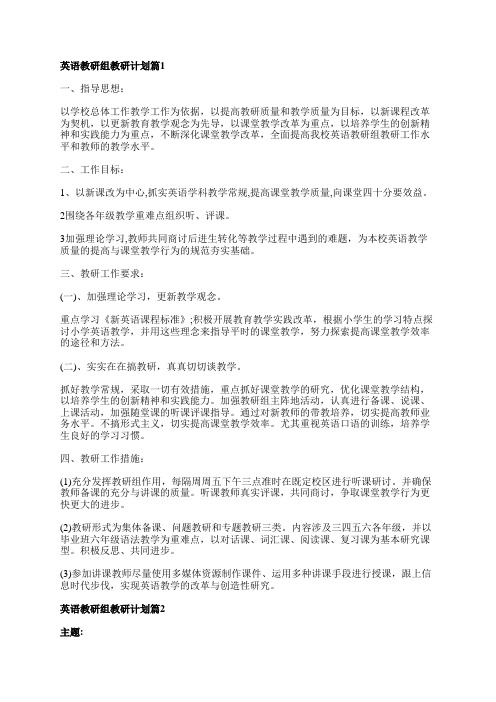
英语教研组教研计划篇1一、指导思想:以学校总体工作教学工作为依据,以提高教研质量和教学质量为目标,以新课程改革为契机,以更新教育教学观念为先导,以课堂教学改革为重点,以培养学生的创新精神和实践能力为重点,不断深化课堂教学改革,全面提高我校英语教研组教研工作水平和教师的教学水平。
二、工作目标:1、以新课改为中心,抓实英语学科教学常规,提高课堂教学质量,向课堂四十分要效益。
2围绕各年级教学重难点组织听、评课。
3加强理论学习,教师共同商讨后进生转化等教学过程中遇到的难题,为本校英语教学质量的提高与课堂教学行为的规范夯实基础。
三、教研工作要求:(一)、加强理论学习,更新教学观念。
重点学习《新英语课程标准》;积极开展教育教学实践改革,根据小学生的学习特点探讨小学英语教学,并用这些理念来指导平时的课堂教学,努力探索提高课堂教学效率的途径和方法。
(二)、实实在在搞教研,真真切切谈教学。
抓好教学常规,采取一切有效措施,重点抓好课堂教学的研究,优化课堂教学结构,以培养学生的创新精神和实践能力。
加强教研组主阵地活动,认真进行备课、说课、上课活动,加强随堂课的听课评课指导。
通过对新教师的带教培养,切实提高教师业务水平。
不搞形式主义,切实提高课堂教学效率。
尤其重视英语口语的训练,培养学生良好的学习习惯。
四、教研工作措施:(1)充分发挥教研组作用,每隔周周五下午三点准时在既定校区进行听课研讨。
并确保教师备课的充分与讲课的质量。
听课教师真实评课,共同商讨,争取课堂教学行为更快更大的进步。
(2)教研形式为集体备课、问题教研和专题教研三类。
内容涉及三四五六各年级,并以毕业班六年级语法教学为重难点,以对话课、词汇课、阅读课、复习课为基本研究课型。
积极反思、共同进步。
(3)参加讲课教师尽量使用多媒体资源制作课件、运用多种讲课手段进行授课,跟上信息时代步伐,实现英语教学的改革与创造性研究。
英语教研组教研计划篇2主题:围绕学校学科开放展示活动和强化学生口语训练,开展相关学科活动。
2017英语教研组工作计划

英语教研组工作计划一、指导思想以课程改革为中心,围绕课改完善和深化学科教学常规,组织教师参加理论学习和培训,组织研究课和专题研讨等系列活动,促进教师整体素质和学科教学质量的提高。
以科研为动力,改革学科课程,促进教研组工作的有序发展,进一步提高教师的业务素质和科学素养。
二、工作要点:(一)加强教育理论学习,提高教师理论素养1.参加全员培训及考试。
2.组织本教研组教师撰写论文和课题的研究。
全体英语老师要通过理论学习,不断反思、探索,并联系实际积极撰写外语教育教学论文。
根据学科教学的热点、难点问题积极开展课改探究。
(二)狠抓教学常规落实。
1.进一步抓好"教学常规"的学习和实施工作,组织本教研组年轻教师学习常规,学习校内外先进典型,加强检查督促,使学习常规,实施常规成为全体教师的自觉行动。
2.加强集体备课。
集体备课是发挥群体优势,提高备课质量的重要途径,也是落实教学常规,提高课堂教学效率的必要措施。
为此,我教研组要积极组织集体备课,做到有计划、有目标、有实效。
3.抓好教研组建设。
教研组要在落实常规方面发挥重要作用,要做好常规落实的检查、督促工作;要定期组织教学研究活动,围绕相应的研究专题,组织相应的公开课、研究课、示范课,通过研讨、观摩、评议等形式,使本教研组全体英语教师共同提高,人人受益。
(三)立足课堂,关注课堂,研究新课程标准下的教学基本规律。
1.结合教师一学期一次的汇报课,教研组要切实做好活动的组织工作,在教研活动中进行说课、评课等活动,把学生学习方式的优化与教师教学方式的改变作为课程改革研讨的重点来加以讨论,引导教师把先进的教育理念转变为教学行为。
2.合理安排和组织教学活动,组织相应的时间对全校学生进行口语等级测试的训练,并在校内组织预测检查工作。
3.搞好学科活动三、时间安排。
英文教研组工作计划

英文教研组工作计划
目标
本工作计划的目标是提高英文教研组的教学质量和教师专业素养,以及促进学生英语能力的全面发展。
活动
1. 教学研讨会
定期组织英文教研组教师进行教学研讨会,分享教学经验和有效的教学方法。
研讨会的主题包括课程设计、教学策略和评估方法等。
每位教师应参与至少一次研讨会,并向其他教师分享自己的教学经验。
2. 教学观摩与评议
定期组织教学观摩活动,教师相互观摩彼此的教学过程,并提
供评议意见和建议。
观摩活动可以促进教师之间的交流和互相研究,并加深对教学方法的理解和应用。
3. 教材研究与开发
英文教研组应定期研究并评估教材的有效性,根据教学需求进
行必要的调整和改进。
同时,鼓励教师自主开发和分享适合学生研
究需求的教学资源,提高教学效果。
4. 学生活动组织
英文教研组应积极组织各类英语研究活动,如英语角、演讲比赛、英语文化周等。
这些活动可以激发学生研究英语的兴趣,提高
他们的口语表达和沟通能力。
5. 学科竞赛指导
鼓励教师参与学科竞赛的指导工作,提供学科竞赛的培训和指导材料。
积极培养学生参与各类英语竞赛,提高他们的英语水平和自信心。
定期检查与评估
为确保工作计划的有效性,英文教研组应定期进行工作检查与评估。
通过教师评估和学生反馈,及时调整工作策略并改善教学质量。
期望成果
通过实施以上工作计划,预计英文教研组可以提高教师的教学水平和专业素养,进一步提升学生的英语能力,为学生的综合发展打下坚实的英语基础。
2017高中英语教研组工作计划,英语教研组工作计划精选

2017高中英语教研组工作计划一、工作目标本年度的工作目标是提高高中英语教师的教学水平,增强学生的英语学习能力。
通过教研组的共同努力,为学生提供更好的英语学习环境和教学资源。
二、工作重点1.教学资源开发和共享2.教学方法研究与创新3.定期教学交流与反馈4.学科竞赛和活动组织三、具体工作计划1. 教学资源开发和共享•收集和整理各学段的英语教材和教辅资源,建立资源库•制定资源共享的规范和机制,鼓励教师分享优秀资源•定期组织资源分享会,优秀资源将被录入资源库2. 教学方法研究与创新•跟进高中英语教学改革的最新动态,掌握教学新理念和新方法•定期开展教研活动,探索有效的教学策略和方法•推广先进的教学技术和工具,提高教师的教学效果3. 定期教学交流与反馈•每学期至少举办一次教学交流会,分享教学经验和教学成果•鼓励教师互相观摩课程,提供反馈和建议•教学交流会后,汇总教师的反馈和建议,进行汇总和总结4. 学科竞赛和活动组织•组织学科竞赛,激发学生的学习兴趣和竞争意识•组织英语角、英语演讲比赛等活动,提高学生的口语交际能力•开展英语文化节和英语周等活动,丰富学生的英语学习体验四、工作计划执行与评估1. 工作计划执行•设立明确的工作目标和时间节点,监督工作进度和完成情况•分工合作,明确工作责任和任务,确保工作计划的顺利进行•定期召开工作会议,对工作进展进行评估和调整2. 工作成果评估•定期评估教师的教学效果和学生的学习情况•收集学生和家长的意见和建议,评估教研组的工作成果•根据评估结果,及时调整工作计划和教学策略五、工作计划实施的保障措施1.提供必要的教育培训和学习机会,提高教师的专业水平2.配备必要的教学设备和资源,提供良好的教学环境3.开展教师奖励制度,激励教师的教学热情和创新能力4.加强教研组的组织管理和调动教师的积极性,形成合力六、总结通过本年度的工作计划,英语教研组将致力于提高高中英语教师的教学水平,增强学生的英语学习能力。
2017年初中英语教研组工作计划

2017年初中英语教研组工作计划【第1篇】2017年初中英语教研组工作计划一、指导思想1.围绕学校的育人目标,以《中学英语课程标准》为基本标准, 以激发和培养学生的学习英语的兴趣为基本任务,使学生养成良好的学习习惯和形成有效的学习策略,发展自主学习的精神和合作精神;使学生掌握一定的英语基础知识和听说读写技能,形成一定的综合语言运用能力。
2.围绕教研组发展的要求,以教师成长为目标,以校本研修为主线,以课堂教学为载体,以各级各类教研活动为依托,全面促进教研组的进步和发展。
二、工作重点本学期初中英语教学教研工作,要以课堂教学为中心,围绕高效课堂教学改革,通过组织教师进行课改理论学习、安排公开课、建立资源库等一系列活动来促进初中英语教学质量的提高。
1.七年级要抓好小学与初中的衔接教学。
七年级学生在小学阶段学了小学英语教材,基本上达到了小学英语教学的要求,但也出现了一定的分化现象,教师要及早摸清情况,根据我校的实际,采取切实有效的措施,抓好中小学衔接教学。
在这个基础上进一步培养兴趣,强化基础,抓好起始年级的英语学习习惯。
2.八年级要培优补差,强化后进生的转化工作。
八年级教师对本班的后进生,要了解其思想动态、寻找致差原因,有的放矢,区别对待,耐心辅导,力求稳住和缩小两极分化程度。
3.九年级教学要以本为本、以纲为纲。
在扎实认真教好课本基础知识的同时,还要挖掘潜力,查缺补漏,着力加强学法指导和能力培养。
特别是要认真学习《考纲》和近几年中考英语真题,注意对考试动向的信息收集和试题研究,提高毕业班教学效率。
三、工作措施1.加强教育理论学习本学期教研组各位老师要通过网上下载、分散学习和教研组会和备课组讨论交流等方式来学习《基础教育课程改革纲要》和《英语课程标准》等有关课程改革的材料,明确英语课程在基础教育阶段的四个基本任务,理解课程标准中的六个基本理念,并用这些理念来指导平时的课堂教学,以提高课堂教学效率。
2.做好教学常规工作在开学初的教研组活动中全组教师要认真学习本校的教学管理制度及常规要求,明确上课、备课、编写教案、导学案、布置作业及作业批阅中的一些具体要求,使大家从思想上重视起来。
2017年小学英语教研组工作计划
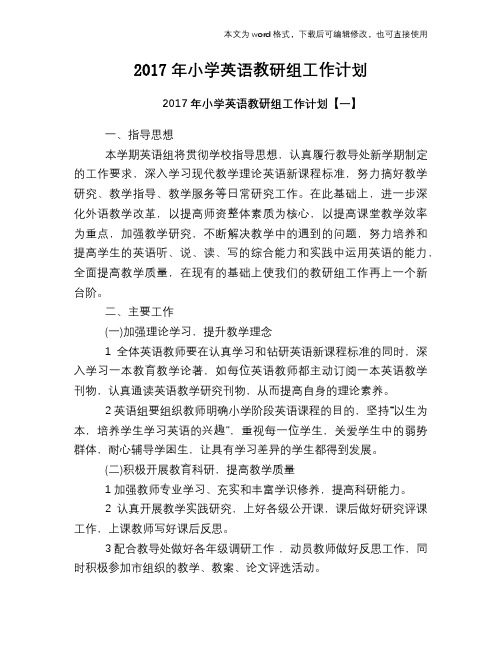
本文为word格式,下载后可编辑修改,也可直接使用2017年小学英语教研组工作计划
2017年小学英语教研组工作计划【一】
一、指导思想
本学期英语组将贯彻学校指导思想,认真履行教导处新学期制定的工作要求,深入学习现代教学理论英语新课程标准,努力搞好教学研究、教学指导、教学服务等日常研究工作。
在此基础上,进一步深化外语教学改革,以提高师资整体素质为核心,以提高课堂教学效率为重点,加强教学研究,不断解决教学中的遇到的问题,努力培养和提高学生的英语听、说、读、写的综合能力和实践中运用英语的能力,全面提高教学质量,在现有的基础上使我们的教研组工作再上一个新台阶。
二、主要工作
(一)加强理论学习,提升教学理念
1全体英语教师要在认真学习和钻研英语新课程标准的同时,深入学习一本教育教学论著,如每位英语教师都主动订阅一本英语教学刊物,认真通读英语教学研究刊物,从而提高自身的理论素养。
2英语组要组织教师明确小学阶段英语课程的目的,坚持“以生为本,培养学生学习英语的兴趣”,重视每一位学生,关爱学生中的弱势群体,耐心辅导学困生,让具有学习差异的学生都得到发展。
(二)积极开展教育科研,提高教学质量
1加强教师专业学习、充实和丰富学识修养,提高科研能力。
2认真开展教学实践研究,上好各级公开课,课后做好研究评课工作,上课教师写好课后反思。
3配合教导处做好各年级调研工作,动员教师做好反思工作,同。
英语科组教研活动规划(3篇)
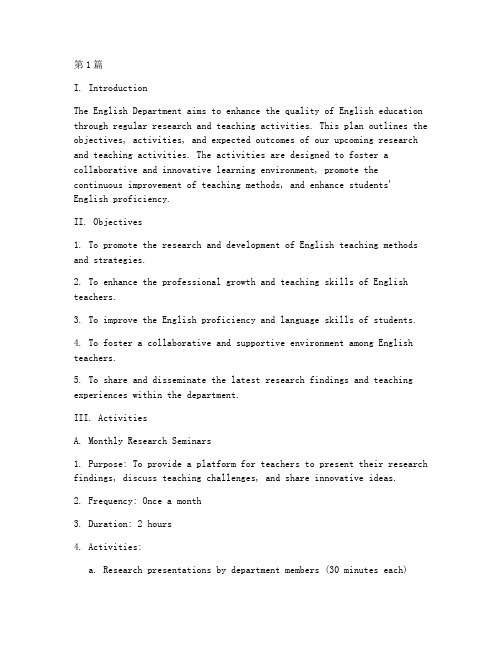
第1篇I. IntroductionThe English Department aims to enhance the quality of English education through regular research and teaching activities. This plan outlines the objectives, activities, and expected outcomes of our upcoming research and teaching activities. The activities are designed to foster a collaborative and innovative learning environment, promote the continuous improvement of teaching methods, and enhance students' English proficiency.II. Objectives1. To promote the research and development of English teaching methods and strategies.2. To enhance the professional growth and teaching skills of English teachers.3. To improve the English proficiency and language skills of students.4. To foster a collaborative and supportive environment among English teachers.5. To share and disseminate the latest research findings and teaching experiences within the department.III. ActivitiesA. Monthly Research Seminars1. Purpose: To provide a platform for teachers to present their research findings, discuss teaching challenges, and share innovative ideas.2. Frequency: Once a month3. Duration: 2 hours4. Activities:a. Research presentations by department members (30 minutes each)b. Group discussions on the presented topics (30 minutes)c. Guest speakers from other educational institutions or experts in the field (30 minutes)d. Open forum for questions and suggestions (30 minutes)B. Professional Development Workshops1. Purpose: To enhance the teaching skills and knowledge of English teachers.2. Frequency: Biannually3. Duration: 2 days4. Activities:a. Workshops on new teaching methods and technologies (e.g., flipped classrooms, online learning platforms)b. Interactive sessions on classroom management and student engagementc. Expert-led sessions on language acquisition and proficiencyd. Peer observations and feedback sessionsC. Student-Centered Teaching Projects1. Purpose: To encourage teachers to implement student-centered teaching approaches and evaluate their effectiveness.2. Frequency: Annually3. Duration: 1 month4. Activities:a. Selection of a student-centered teaching project by each teacherb. Implementation of the project in the classroomc. Documentation of the project's progress and outcomesd. Sharing of project results during a departmental meetingD. English Language and Literature Conference1. Purpose: To provide an opportunity for teachers to present their research, exchange ideas, and network with other professionals in the field.2. Frequency: Biannually3. Duration: 1 day4. Activities:a. Research presentations by department members and external expertsb. Panel discussions on current trends and challenges in English educationc. Workshops on specific topics (e.g., assessment, curriculum development)d. Networking sessions and social eventsE. English Language Teaching Competition1. Purpose: To encourage creativity and innovation in English teaching methods among teachers.2. Frequency: Annually3. Duration: 1 month4. Activities:a. Teachers submit proposals for innovative teaching projectsb. Selection of the top projects by a panel of judgesc. Implementation of the selected projects in the classroomd. Evaluation of the projects based on student feedback and outcomesIV. Expected Outcomes1. Enhanced research and teaching skills among English teachers.2. Improved English proficiency and language skills of students.3. Increased collaboration and support among English teachers.4. Enhanced departmental reputation and contribution to the field of English education.5. Development of a culture of continuous improvement and innovation in English teaching.V. Implementation and EvaluationA. Implementation:1. The department chairperson will coordinate the planning and execution of the activities.2. A dedicated team of coordinators will be responsible for organizing each event.3. Communication channels, such as email, departmental website, and meetings, will be used to inform teachers about the activities.B. Evaluation:1. Feedback forms will be distributed to teachers and students after each activity to assess the effectiveness and relevance of the activities.2. The department chairperson will conduct periodic reviews of the activities to ensure they align with the department's objectives.3. Adjustments will be made based on the feedback and reviews to optimize the impact of the activities.VI. ConclusionThis English Department Research and Teaching Activity Plan aims to foster a culture of continuous improvement and innovation in English education. By implementing the outlined activities, we expect to enhancethe professional growth of our teachers, improve student learning outcomes, and contribute to the advancement of English education in our institution.第2篇I. IntroductionThe English Department of [School Name] is committed to fostering ahigh-quality educational environment that not only imparts language skills but also encourages critical thinking and cultural understanding. This research and teaching activity plan is designed to enhance the department's overall effectiveness, promote continuous professional development, and ensure that our students receive a comprehensive and engaging English education.II. Objectives1. Enhance Teaching Quality: To improve the teaching methods and strategies used by English teachers, ensuring that students receive a well-rounded education.2. Promote Professional Development: To encourage teachers to engage in ongoing professional development activities that enhance their subject knowledge and pedagogical skills.3. Integrate Technology: To explore and integrate modern educational technologies into the classroom to enhance learning experiences.4. Cultivate Cultural Awareness: To develop teachers' and students' understanding of different cultures, fostering global citizenship.5. Collaborate with Stakeholders: To build strong relationships with other departments, parents, and the wider community to support student learning.III. Activity DetailsA. Monthly Research Seminars1. Frequency: Held once a month.2. Duration: 2 hours.3. Format: Each seminar will feature a guest speaker or a departmental presentation on a specific topic related to English language teaching and learning.4. Topics:- Innovative teaching methods- Language acquisition theories- Technology in the classroom- Assessment and evaluation strategies- Cross-cultural communicationB. Professional Development Workshops1. Frequency: Twice a term.2. Duration: 1 day.3. Format: Interactive workshops designed to provide practical skills and knowledge.4. Workshop Topics:- Classroom management techniques- Differentiated instruction- Assessment for learning- Inquiry-based learning- Flipped classroom approachC. Peer Observation and Feedback1. Frequency: Monthly.2. Duration: 1 hour.3. Format: Teachers will observe each other's lessons and provide constructive feedback.4. Objectives: To identify strengths and areas for improvement, promote collaboration, and share best practices.D. Collaborative Lesson Planning1. Frequency: Bi-weekly.2. Duration: 1 hour.3. Format: Teachers will work in pairs or small groups to plan and develop integrated units of work.4. Objectives: To encourage collaboration, share resources, and create engaging and relevant lesson plans.E. Student-Led Conferences1. Frequency: Twice a year.2. Duration: 1 hour per student.3. Format: Students will meet with their teachers to discuss their progress, set goals, and plan for the future.4. Objectives: To empower students, promote self-reflection, and develop independent learning skills.F. Parent Workshops1. Frequency: Twice a year.2. Duration: 1 hour.3. Format: Information sessions for parents on various aspects of English language learning and support.4. Workshop Topics:- How to support your child’s English learning at home- The importance of reading- Strategies for improving writing skills- Tips for effective communication with teachersIV. Implementation and EvaluationA. ImplementationThe English Department Head will be responsible for the overall coordination of the research and teaching activities. Each activity will have a designated coordinator who will ensure that the plan is implemented effectively.B. Evaluation1. Teacher Feedback: Regular feedback from teachers will be collected to assess the effectiveness of the activities and make necessary adjustments.2. Student Performance: Student performance will be monitored to evaluate the impact of the activities on learning outcomes.3. Parent Feedback: Feedback from parents will be collected through surveys and workshops to gauge their satisfaction with the activities and their impact on their child’s learning.V. ConclusionThis research and teaching activity plan aims to enhance the quality of English education at [School Name]. By focusing on professional development, technology integration, and student-centered approaches, we hope to create an engaging and effective learning environment for all students. Regular evaluation and feedback will ensure that the plan remains dynamic and responsive to the needs of our students, teachers, and community.第3篇Introduction:The English Department aims to enhance the quality of English education through collaborative research and teaching activities. This planoutlines the objectives, activities, and timelines for our upcoming教研活动,with the goal of fostering a culture of continuous improvement and professional development among our faculty.Objective:To improve the teaching and learning of English by promoting research-based practices, sharing innovative teaching methods, and enhancing professional growth among the English Department faculty.I. Preparatory Phase (Weeks 1-2):1.1 Establishing the Committee:- Form a committee consisting of department heads, senior teachers, and representatives from different teaching levels.- Assign roles and responsibilities to ensure effective coordination and execution of activities.1.2 Gathering Feedback:- Conduct surveys or interviews to gather feedback from teachers regarding their current teaching challenges, needs, and areas for improvement.- Compile and analyze the feedback to identify key areas of focus for the教研活动.1.3 Setting Objectives:- Based on the feedback, set specific, measurable, achievable, relevant, and time-bound (SMART) objectives for the教研活动.II. Research and Development Phase (Weeks 3-6):2.1 Workshops and Seminars:- Organize workshops and seminars on topics such as:- Effective teaching strategies for diverse learning styles- Technology integration in English language teaching- Assessment and evaluation techniques- Current trends in English language education- Invite experts and scholars to deliver presentations and facilitate discussions.2.2 Action Research Projects:- Encourage teachers to participate in action research projects to address specific teaching challenges.- Provide guidance and support to facilitate the research process.2.3 Collaborative Planning:- Schedule collaborative planning sessions to share teaching materials, resources, and ideas among teachers.- Promote the development of interdisciplinary and cross-level teaching plans.III. Implementation Phase (Weeks 7-10):3.1 Teaching Trips:- Organize teaching trips to schools with successful English language programs to observe and learn from their practices.- Assign teachers to document their observations and share insights with the department.3.2 Peer Observation and Feedback:- Implement a peer observation and feedback system to provide constructive criticism and support for each other's teaching.- Schedule regular observation sessions and follow-up meetings to discuss feedback and implement improvements.3.3 Professional Development Workshops:- Continue with professional development workshops focusing on specific teaching areas, such as grammar, vocabulary, or literature.- Provide certificates of participation for teachers who complete the workshops.IV. Evaluation and Reflection Phase (Weeks 11-12):4.1 Data Collection:- Collect data on the outcomes of the教研活动, including teacher feedback, student performance, and attendance at workshops and seminars.- Analyze the data to assess the effectiveness of the activities.4.2 Reflective Meetings:- Conduct reflective meetings with the department to discuss the successes and challenges of the教研活动.- Identify areas for further improvement and plan future activities based on the feedback and data collected.V. Follow-up and Sustainability (Ongoing):5.1 Continuous Support:- Provide ongoing support to teachers, including access to resources, professional development opportunities, and mentorship programs.- Establish a platform for sharing best practices and resources among teachers.5.2 Monitoring and Review:- Regularly monitor the implementation of the教研活动计划 and make adjustments as needed.- Conduct periodic reviews to ensure the long-term sustainability of the activities and their impact on the quality of English education.Conclusion:This English Department Research and Teaching Activity Plan aims to foster a culture of continuous improvement and professional development among our faculty. By engaging in collaborative research and sharing innovative teaching methods, we believe that we can enhance the teaching and learning of English and ultimately improve the overall quality of our educational programs.。
英语教研组工作计划(5篇)

英语教研组工作计划一、指导思想:本学期我们英语教研组工作以区教育局的有关精神、本校教育教学工作计划为依据,以新课程标准为导航,以提高本校英语教研、教学质量为目标,提高教师的学习意识、服务意识、质量意识、合作意识和教科研意识。
开展实效、和谐的教研活动,探究科学有效的课堂教学形式,结合本教研组的实际情况和学生的英语学习状况,改进以往做得不够的地方,为进一步提高我校的英语教学质量而扎实工作。
二、主要工作:1、进一步加强理论学习,更新教学理念。
全体英语教师都要抽出时间学习新理论,以先进的教育理念指导自己的教育教学实践。
本学期要学习有关有效教学资料以及改进评价内容和评价方法的资料,努力做到关注学生学业成就的同时,还要关注学生情感态度、行为方式的发展,注重培养学生综合实践的能力,全面提高学生的素质。
2、进一步有序、规范、高效地组织开展教研活动。
教研组活动力求做到计划先行、科学安排、内容充实、组织规范、成效显著,教研组活动记录详实。
(1)开展公开课、听、评课活动通过课堂教学的研讨活动来促进课堂教学不断优化。
本学期仍继续做好开展公开课、互相听课、互相评课工作,取长补短,使教研组全体英语教师能够共同提高、人人受益。
(2)写教学反思对自己的教学不断反思,才会有不断的进步。
因此根据自己的实际课堂教学情况,提倡多进行教后反思。
要求每一模块教学写一个教学反思,全学期不少于____个,要有质量。
3、强化教学常规的落实,提高课堂教学效率。
每月检查教师的教学工作,特别抓好“备课”、“上课”、“作业批改”、“课后辅导”等主要环节,鼓励教师充分发挥教学特长,有效提高教学效率。
提高作业质量,规范作业批改。
按照“有发必收,有收必批,有批必评,有错必纠”的总要求。
英语教研组工作计划(二)一,加强落实各项常规工作。
在备课-上课-作业-辅导-考试这一系列环节上,要做到常规化、制度化。
尤其要针对备课和作业两个环节进行检查:通过优化课堂教学设计,提高课堂教学质量,提升合格率和优良率;优化作业布置,提高批改质量。
英语教研组工作计划(优秀5篇)

英语教研组工作计划(优秀5篇)英语教研组工作计划篇一一、指导思想:本学期,英语教研联组要在新的课程标准指导下,全面贯彻党的教育方针,深化英语教学改革,更新教育教学观念,大力实施素质教育,并结合英语学科自身的特点,扎实有效地开展工作,提高英语课堂教学效率,大面积提高英语教育教学质量。
二、工作重点:本学年英语学科教研工作,要以课程改革为中心,围绕课改完善和深化学科教学常规,组织教师参加多种形式的课改理论学习;组织开展初三毕业班复习迎考、初中词汇教学、校本教研等研讨活动;参加有效课堂教学研究课赛课等系列活动;抓好初中毕业班的复习迎考工作,促进教师转变教学观念,促进英语学科教学质量的提高。
三、具体措施:1、加强教育理论学习,提高教师理论素养。
英语教师要根据本年级实际选择合适的教学理论来学习,制定切实可行的学习计划,采用集体学习和个人学习相结合的办法把学习、实践与经验总结结合起来,切实提高自己的教育理论修养和教育教学能力。
2、充分发挥教研组长和骨干教师在教研中的积极作用。
要求做到有计划、有重点、有目标地开展多形式的校本教研活动。
3、要充分发挥骨干教师的示范作用,听他们讲课、做理论讲座,进一步提高英语组教师的理论水平和教育教学水平。
4、加强集体备课,强化教学常规的落实,提高课堂教学效率,组织教师认真学习学校教学常规,指导检查教师的教学工作,特别抓好“备课”、“上课”、“课后辅导”、“培优辅导”等主要环节,鼓励教师充分发挥教学特长,有效提高教学效率。
5、加强初三毕业班工作的研究,提高毕业班教学效率,组织全组成员认真学习《大纲》、《中考说明》,加强对中考动向的信息收集和试题研究。
有计划地组织开展初三毕业班复习迎考。
应根据实际情况制定初三复习计划及差生辅导计划;英语总复习分三轮进行:第一轮:分册复习。
时间为四月初到五月中旬。
七年级的复习进度为每课时两单元,两周完成。
八年级、九年级的复习进度为每课时一个半单元,两周半完成八年级,一周半完成九年级的复习。
英语组教研活动计划

英语组教研活动计划1. 引言在现代社会,英语已经成为一门世界性的语言,而英语教学水平的提高对于学生的综合素质培养具有至关重要的作用。
为了提高我校英语教师的教学水平,我们英语组决定开展教研活动,以促进教师之间的交流与合作,提高教学质量。
2. 活动目标我们的活动目标是提高教师的教学能力,促进相互之间的协作与学习。
通过集体备课、课堂观摩和教学研讨等方式,不断提高每位英语教师的专业水平,提升学生英语学习的效果。
3. 活动计划3.1 集体备课我们将组织每周一次的集体备课活动。
每位教师都有机会分享自己的备课思路和教学资源,让大家相互学习、借鉴,共同提高。
同时,我们也会邀请一些有经验的教师来分享自己的教学经验,为大家提供指导和帮助。
3.2 课堂观摩我们将定期组织课堂观摩活动。
每位教师都有机会到其他同事的课堂上进行观摩,从中学习优秀的教学方法和技巧。
观摩后,我们会进行交流和讨论,共同总结出有效的教学策略,并加以应用到自己的教学实践中。
3.3 教学研讨会我们将不定期组织教学研讨会。
会议上,每位教师都可以展示自己的教学设计和教学成果,与其他教师进行分享和讨论,互相提供建议和意见。
同时,我们也会邀请一些专家学者来做学术报告,为我们提供更深入的教学理论和方法指导。
4. 活动评估与反馈我们将定期对教研活动进行评估与反馈。
通过教师们的反馈意见和学生的学习情况来评估活动的效果,并不断调整和改进活动方案。
同时,我们也会鼓励教师们积极参加其他学校或教育机构举办的教研活动,进一步拓宽我们的视野,丰富我们的教学经验。
5. 结束语教研活动是提高教师教学水平的重要途径,也是促进教育事业发展的重要举措。
通过本次教研活动的开展,我们相信每位教师都能够取得显著的进步,为学生的英语学习贡献更多的力量。
我们期待着教研活动带来的积极变化,并相信这将对学生的学习成绩和整体素质的提升都产生积极的影响。
让我们一起加油,为英语教育事业做出更大的贡献!。
英语教研组工作计划(5篇)
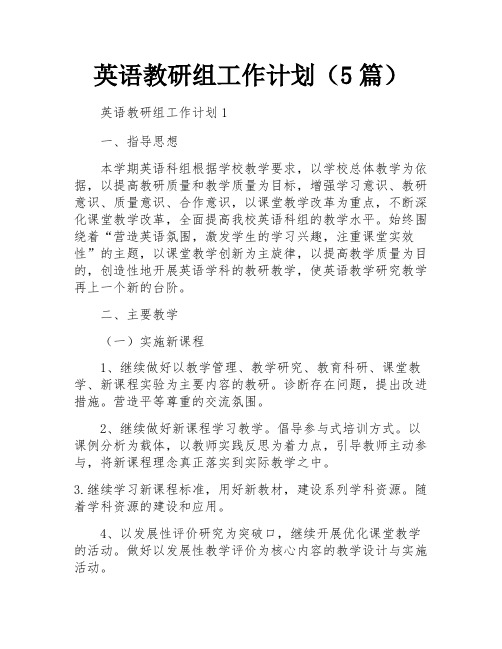
英语教研组工作计划(5篇)英语教研组工作计划1一、指导思想本学期英语科组根据学校教学要求,以学校总体教学为依据,以提高教研质量和教学质量为目标,增强学习意识、教研意识、质量意识、合作意识,以课堂教学改革为重点,不断深化课堂教学改革,全面提高我校英语科组的教学水平。
始终围绕着“营造英语氛围,激发学生的学习兴趣,注重课堂实效性”的主题,以课堂教学创新为主旋律,以提高教学质量为目的,创造性地开展英语学科的教研教学,使英语教学研究教学再上一个新的台阶。
二、主要教学(一)实施新课程1、继续做好以教学管理、教学研究、教育科研、课堂教学、新课程实验为主要内容的教研。
诊断存在问题,提出改进措施。
营造平等尊重的交流氛围。
2、继续做好新课程学习教学。
倡导参与式培训方式。
以课例分析为载体,以教师实践反思为着力点,引导教师主动参与,将新课程理念真正落实到实际教学之中。
3.继续学习新课程标准,用好新教材,建设系列学科资源。
随着学科资源的建设和应用。
4、以发展性评价研究为突破口,继续开展优化课堂教学的活动。
做好以发展性教学评价为核心内容的教学设计与实施活动。
5、健全理论、业务学习制度,做好新教师的传、帮、带和教学能力较差教师的扶持教学,要做好骨干教师的示范带头作用,发挥他们在新课程、新教材、教法的作用。
鼓励教师之间的相互交流与学习。
(二)提高学生的英语能力1.为了加强英语基础教育,创造听说条件,营造英语氛围,提高交际能力。
2.举办英语书法比赛评比活动,实行各种奖励激励机制,最大限度地调动学生的积极性,使师生以最大的热情投入到情境活动中。
3、开展英语竞赛。
(三)开展课外活动,激发学习兴趣课外活动是重要的教学辅助手段,有利于增长知识,开阔视野。
有目的、有组织的适合学生语言水平和年龄特点的课外活动,能使学生生动、活泼、主动地学习,激发学习热情,参与意识,培养兴趣。
我们准备根据不同年级的知识水平组织一些丰富多彩的课外活动。
1、充分利用校园广播。
- 1、下载文档前请自行甄别文档内容的完整性,平台不提供额外的编辑、内容补充、找答案等附加服务。
- 2、"仅部分预览"的文档,不可在线预览部分如存在完整性等问题,可反馈申请退款(可完整预览的文档不适用该条件!)。
- 3、如文档侵犯您的权益,请联系客服反馈,我们会尽快为您处理(人工客服工作时间:9:00-18:30)。
英语教研组工作计划
一、指导思想
1.按照我校教学工作计划和育人总体目标,以《中学英语课程标准》为基本标准,以激发和培养学生学习英语的兴趣为抓手,帮助学生养成良好的学习习惯、形成正确的学习方法,培养学生自主学习和与他人合作的能力;使学生在掌握一定的英语基础知识和听说读写技能的基础上,形成一定的综合语言运用能力。
2.围绕学校对英语工作的要求,以教师专业成长为目标,以校本研修为主线,以课堂教学活动为载体,以各级各类培训和教研活动为依托,全面提升英语教师个人的人文素养、专业素养和教学能力,促进教研组整体的进步和发展。
二、师生现状分析
1. 学生中存在的不良习气
部分同学厌学思想严重,责任意识缺失,合作意识淡化,缺乏必要的吃苦精神,认读能力明显降低,课堂内持续注意时间的长度严重缩短,过度依赖网络、班内、跨年级抄袭作业的现象比较严重。
这些问题是阻碍提高英语教学质量的硬伤。
2. 教师方面
通过近几年参加校内外各种培训,老师们的敬业精神、工作责任心明显增强,他们的人文素养、教育教学理论修养和教育教学能力完全能够胜任英语教学工作。
三、工作重点
本学期仍然以研究课堂教学和提升个人教学能力为中心,围绕高效课堂教学改革,通过组织教师进行课改理论专题学习、优化集体备课环节,以骨干教师带动其他教师、师徒结对共同提高、交流展示等一系列活动和方式来促进教师的专业能力提升。
四、工作目标
激发学生英语学习兴趣,养成良好的学习习惯,学会正确的学习方法;抓常态课堂、促课堂效率提高,使各年级英语教学的“双率”稳中有升。
教学团队得到锻炼,教育教学能力提升明显。
五、工作措施
1.加强教育理论学习,努力提高教书育人本领。
全组老师要通过个人自学、教研组会和备课组讨论交流等方式来重点学习《基础教育课程改革纲要》《英语课程标准》《英语课程标准》解读,明确英语课程在基础教育阶段的四个基本任务,理解课程标准中的"六个基本理念",并用这些理念来指导平时的教育教学行为,努力提高教书育人本领,做到关注学生学业成长的同时,还要关注学生情感态度、行为方式的发展,注重培养学生的语言综合运用能力,全面提高学生的素质。
2. 结合教育教学实际开展专题学习。
专题学习材料要紧扣教学实际,内容侧重于能开拓思路、对解决实际问题有借鉴和指导意义。
专题学习的主讲人准备好学习材料,并设置1---2个研讨题目,提前一周下发到组员手中,给予组员充分的时间自学和思考。
与专题学习的主讲人在同一组的
组员是主要发言人。
专题学习要充分准备,组员要积极发言,在不断的学习和研讨中提升理论素养和解决实际问题的能力。
3. 认真落实我校“全员德育”的实施指导意见,抓日常习惯培养,促学风转变。
全体组员要加强与班主任、科任老师的联系,紧密协作,摸清每一位同学的思想动态和现实表现,努力帮助后进学生提高认识水平、增强责任意识、树立自信、改正不良习气、养成好学上进的良好习惯,确保“高效课堂”扎实推进。
4. 加强集体备课,要做到有计划、有目标、注重突出实效。
各备课组要做到每周集体备课一次,围绕相关话题,展开讨论,组员要认真听取对同一问题的不同处理意见,借鉴吸收更可行的方法。
备课组要统一教学进度,统一教学重难点,统一作业内容,做到发现问题,及时沟通,并修改教学设计,做好二次备课,以集体的力量和智慧来提高全组教师的业务水平和教育教学能力。
5. 上好交流课。
交流课要尽可能展示个人的教学风格。
把功夫下在集体备课上。
听课教师在听课前,要浏览熟悉所听课的教材内容;听课中多关注教学设计各环节的落实情况、上课教师和学生的课堂表现等。
评课时侧重学生参与的广度,教学方法、学法指导是否恰当、实际的教学效果。
大家要做到坦诚相见,知无不言,言无不尽。
真正做到使上课教师教学水平有提高,听课教师有感悟。
6. 作业布置要有差异化。
充分考虑部分学困生的实际困难,难题、大题不做要求。
以能学会做为标准,以学通学懂为目的,减少他们为完成个人能力之外作业而抄袭的现象发生。
7. 在七、八年级开展好朗读、演讲比赛。
语言学习的突出特点就是多朗读、多背诵、多听写。
部分同学英语学习中读音差别较大、单词记忆经常不过关,导致认读能力退化严重;课后没有复习、朗读课文的习惯,是英语学习退步的主要原因。
为激发学生的学习热情、促进提高课堂教学效率开展朗读、演讲比赛。
此项工作由备课组长负责,其他任课老师具体组织实施。
七、八年级的决赛时间分别是四月、第17周。
8. 九年级教学工作要抓实抓细,抓出成效。
在总结反思往届毕业班成功教学经验的基础上,加强学法指导和能力培养,挖掘潜力,查缺补漏;着重对复习课型,中考命题方向和命题的基本原则、方法、思路的探讨研究,做到复习的针对性强,教学效率高,临界生进步大,高分人数有突破。
9. 积极申报和参与国家课程校本化的课题研究。
10. 积极参加“一师一优课,一课一名师”竞赛活动。
2017.03.03
英语教研组2016—2017年第二学期教研活动安排表。
